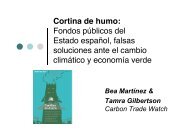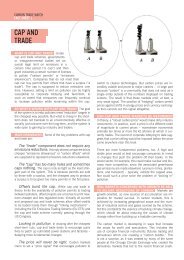The Sky is Not the Limit: - Carbon Trade Watch
The Sky is Not the Limit: - Carbon Trade Watch
The Sky is Not the Limit: - Carbon Trade Watch
- No tags were found...
You also want an ePaper? Increase the reach of your titles
YUMPU automatically turns print PDFs into web optimized ePapers that Google loves.
market rhetoric begins to clear.Em<strong>is</strong>sions trading <strong>is</strong> bad for peopleand <strong>the</strong> planet. It <strong>is</strong> <strong>the</strong> child of aneconomic system that has wreakedhavoc on ecosystems andcommunities across <strong>the</strong> globe. Butinstead of learning <strong>the</strong> lessons from ad<strong>is</strong>astrous h<strong>is</strong>tory of imposing onesize-fits-all,top-down policies,em<strong>is</strong>sions trading exemplifies thatapproach, closing off <strong>the</strong> space fromwhich grassroots bottom-up solutionscould emerge.<strong>The</strong> only instance where an em<strong>is</strong>sionstrading scheme could work, for morethan <strong>the</strong> free-market economicsystem, <strong>is</strong> if it were small, highlyregulated, tightly defined, had no copollutantsside effects, had rigorousindependent monitoring andverification and vibrant communityconsultation, participation andassessment. However <strong>the</strong>se are notfeatures of any em<strong>is</strong>sions tradingsystem currently functioning orplanned for <strong>the</strong> future. Ano<strong>the</strong>rinescapable reality of em<strong>is</strong>sionstrading <strong>is</strong> that toxic co-pollutants areinherent in <strong>the</strong> production of mostem<strong>is</strong>sions of local and globalpollutants. <strong>The</strong>refore in no imaginablereality, could em<strong>is</strong>sions trading ‘work’for people and <strong>the</strong> planet.In answer to those critic<strong>is</strong>ms,greenhouse gas em<strong>is</strong>sions tradingproponents, and moderate critics,claim that <strong>the</strong> market <strong>is</strong> a transitionalsolution to give governments andcorporations time to make <strong>the</strong> realchanges that are needed. Howevermajor oil corporations such as BP andShell, both enthusiastic initiators ofinternal trading schemes, have nevervoiced any serious intention to curb<strong>the</strong>ir main activities of oil exploration orproduction in <strong>the</strong> future. In fact, at <strong>the</strong>same time as <strong>the</strong> company claimreductions in em<strong>is</strong>sions internally, BPpredicts that it will increase future oiland gas output by 3 per centannually. 3 Th<strong>is</strong> will take <strong>the</strong>ir totalem<strong>is</strong>sions over that of <strong>the</strong> UK.Fur<strong>the</strong>rmore, BP’s investment inrenewable energy <strong>is</strong> a mere 1 per centof <strong>the</strong> US $8 billion it spends on fossilfuel exploration and production everyyear. 4Corporations, motivated by profit, willnot voluntarily cease damaging <strong>the</strong>planet and destabil<strong>is</strong>ing <strong>the</strong> climate ifthat practice provides <strong>the</strong> main sourceof <strong>the</strong>ir income. Em<strong>is</strong>sions tradingallows big corporations to dodge <strong>the</strong>irresponsibilities, by gaming a system<strong>the</strong>y helped design and makingsuperficial changes in <strong>the</strong>ir behaviourwhile continuing harmful ‘business asusual’ practices. Res<strong>is</strong>tance tocorporate power <strong>is</strong> in danger of beingd<strong>is</strong>tracted by engagement wi<strong>the</strong>m<strong>is</strong>sions markets. Many NGOs willtake up <strong>the</strong>ir role as verifiers andmonitors, ultimately resulting indiv<strong>is</strong>ions between those for andagainst em<strong>is</strong>sions trading. <strong>The</strong>woefully inadequate regulation ofem<strong>is</strong>sions markets ensures that it willbe difficult and time-consuming tocheck <strong>the</strong> veracity of corporations’claims that <strong>the</strong>y have reduced <strong>the</strong>irpollution levels. Meanwhile it will betragically clear how much <strong>the</strong>irem<strong>is</strong>sions have increased throughcontinuing to invest in fossil-fuelprojects, which often result in grossabuse of human rights, such as <strong>the</strong>Baku-Ceyhan pipeline project, and <strong>the</strong>fur<strong>the</strong>r destruction of pr<strong>is</strong>tineecosystems like <strong>the</strong> soon-to-beexploited Arctic.A first giant step backwards<strong>The</strong> market in greenhouse gasesunder <strong>the</strong> Kyoto Protocol signals ah<strong>is</strong>toric proliferation of <strong>the</strong> free-marketprinciple into <strong>the</strong> environmentalsphere. It will be <strong>the</strong> first global tradein em<strong>is</strong>sions and sets a d<strong>is</strong>turbingprecedent. <strong>The</strong> stage has now beenset for <strong>the</strong> fur<strong>the</strong>r encroachment offree-market environmental<strong>is</strong>m intointernational dec<strong>is</strong>ion-makingprocesses.Environmental agreements are nowbeing transformed into economic40











